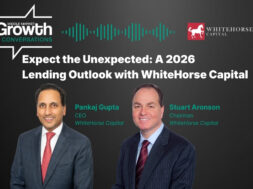How to up Your Operational Game to Stay Competitive and Profitable
Examine how investors' continued enthusiasm for private equity impacts firms' deal flow and capital raising strategy in an increasingly competitive field.

Investor enthusiasm for private equity continues to grow. A primary driver of the sector’s growth is an unrelenting institutional appetite – according to a 2020 Deloitte report, 66% of institutional investors allocated to private equity in 2020, and an estimated 41% plan to increase their PE allocations in 2021.1
What does this mean for deal flow and capital raising? First, more competition is putting pressure on firms to differentiate themselves in an increasingly crowded field. Second, a performance track record is essential, but to stand out, PE managers must also demonstrate strong operational integrity.
This content is sponsored by SS&C Advent. It originally appeared in Middle Market Growth’s 2022 Guide to Dealmaking. Read the full report in the archive.
The growth, diversity, and complexity of private equity funds present substantial operational issues. Accurately allocating profits, losses, expenses, fees, and tax impacts among investors entails a specialized mix of expertise and technology. Investor demand for greater transparency and standardized reporting compounds the challenge. How PE firms manage, account for and report on their funds is essential to client satisfaction and regulatory compliance, not to mention the ability to compete and grow. Resilience and efficiency through automation may well determine how well a firm can manage risks and drive profitability.
Does your current technology platform meet these fundamental requirements?
- Support for complex strategies and structures
- Comprehensive, granular investor accounting, including commitments, calls and waterfall calculations
- Transparency for investors across multiple investments
- Reporting in line with ILPA guidelines
- Automated close rebalancing
- Scalability to keep pace with growth without running up operating costs
TNR: A Foundational Solution
SS&C’s TNR solution provides a modern private equity business foundation, enabling firms to demonstrate best practices, meet transparency demands, and stand up to operational due diligence. As an integrated, front-to-back platform, TNR is specifically designed for private equity fund operations, accounting, data management, and investor servicing and reporting.
A global team of experts backs TNR to help with many aspects of fund operations, including partnership documents, fund structures, investor and fund manager reporting, and tax allocations.
TNR supports the full range of complex fund structures, including master-feeders, holding companies, SPVs, and more. Fundraising and investor relations modules enable you to track capital calls and client communications. In addition, a dedicated web portal provides limited partners with access to their account information, documents, and notices.
Keeping Investors Happy
Given the amount of capital flowing into private equity, the number and variety of funds are bound to grow. Increasing investor interest presents opportunities for fund managers, but winning investor trust is no slam dunk. Institutional investors expect high-quality servicing throughout the relationship, and fund managers must prove they can deliver. A controlled, auditable operating environment demonstrates that fund managers can meet their investor and regulatory obligations, improving their chances of attracting allocations. Having the operational expertise and infrastructure to compete at a high level will be vital to capitalizing on investors’ growing appetite for private equity.
Contact us or request a demo on how SS&C TNR can help you compete more effectively and demonstrate strong operational integrity.
1. Henry, P.; Fumai, F.; Taylor, T.L.; Patel, J. Deloitte. The Growing Private Equity Market. (2020, Nov 5). Retrieved from: https://www2.deloitte.com/us/en/insights/industry/ financial-services/private-equity-industry-forecast.html


